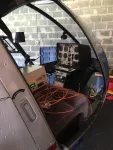Memory helps us evaluate situations on the fly, not just recall the past
Widely known as crucial for long-term memory, hippocampus also supports short-term memory
2021-06-18
(Press-News.org) CHICAGO --- Scientists have long known the brain's hippocampus is crucial for long-term memory. Now a new Northwestern Medicine study has found the hippocampus also plays a role in short-term memory and helps guide decision-making.
The findings shed light on how the hippocampus contributes to memory and exploration, potentially leading to therapies that restore hippocampal function, which is impacted in memory-related aging and neurodegenerative diseases such as dementia, the study authors said.
In the study, scientists monitored participants' brain activity and tracked their eye movements while looking at different complex pictures. The scientists discovered that as we visually scan our environment and absorb new information, our hippocampus becomes activated, using short-term memory to better process new visual information to help us rapidly reevaluate situations.
How our memory helps us scan new environments
Imagine walking down the street and noticing an awkwardly parked car on your neighbor's lawn. Maybe you quickly dismiss it and move on. But when you see an ambulance and fire truck approaching your location, you connect the dots and look back to see the scene of an accident. By using short-term memory to guide where you look, the hippocampus allows you to reexamine the car and form a lasting memory of the accident.
"At any given moment, your brain rapidly initiates eye movements that you are typically unaware of," said corresponding author James Kragel, a postdoctoral research fellow at Northwestern University Feinberg School of Medicine. "Our findings suggest the hippocampus uses memory to inform where your eyes look, thereby priming the visual system to learn and reevaluate our environment on the fly.
"If you didn't look back and see the crash, you might not encode that important information, but in using short-term memory retrieval, you can tie those clues together and remember details that cue bigger memories. It all comes down to building connections among these disparate elements that allow you to remember them later in a much easier way."
The study will be published June 18 in the journal Science Advances.
"These findings emphasize that although hippocampal-dependent memory is typically considered a thing of the past, in fact, it operates in the moment to optimize our behavior and decision-making," said senior study author Joel Voss, associate professor of medical social sciences, neurology, and psychiatry and behavioral sciences at Feinberg. "This is key to understanding hippocampal function and developing effective treatments for memory disorders."
"It is as if you are using your memory to plan for what to expect, and then when it mismatches with what is actually unfolding, your hippocampus gets activated to reevaluate and update your current perception of what is going on," Kragel said.
Tracking eye movements to learn more about memory
The study was conducted on patients with epilepsy who were undergoing neurosurgical monitoring at Northwestern Memorial Hospital to localize the source of their seizures. They had electrodes implanted in their brains to map seizure-related brain activity. During their stay in the epilepsy-monitoring unit, participants performed a memory task in which they studied lists of complex scenes with multiple people and objects (e.g. someone sitting at a park bench with food on the table, things happening in the background) followed by a memory test.
During the test, the participants indicated whether a presented scene was old or new. Throughout the task, the authors simultaneously recorded eye movements and neural activity to link hippocampal activity to memory-guided behaviors.
When studying a scene for the first time, participants often returned their gaze to a location they had just viewed hundreds of milliseconds prior. These "revisitation" eye movements enhanced spatiotemporal memory for scenes (remembering where an object was located or the sequence in which something happened). Brain recordings revealed the brain networks involved in generating these "revisitations," as hippocampal activity shifted just before their execution. Increases in brain activity followed revisitations, which Kragel believes may form a lasting memory of the scene and its elements.
"This shows that the hippocampal contribution to memory unfolds over just hundreds of milliseconds during ongoing behavior, which is surprising given that the timecourse of its involvement, typically seen in long-term memory retrieval, is usually thought to be days to years," Voss said.
INFORMATION:
Other Northwestern co-authors include Dr. Stephan Schuele, chief of epilepsy and clinical neurophysiology at Northwestern Medicine; Dr. Stephen VanHaerents, assistant professor of neurology, medical education and neurology at Feinberg; and Dr. Joshua Rosenow, professor of neurological surgery, neurology and physical medicine and rehabilitation at Feinberg.
ELSE PRESS RELEASES FROM THIS DATE:
2021-06-18
Birds build nests to keep eggs and baby nestlings warm during cool weather, but also make adjustments in nest insulation in such a way the little ones can keep cool in very hot conditions. Mammals, such as rabbits or groundhogs, sleep or hibernate in underground burrows that provide stable, moderate temperatures and avoid above-ground conditions that often are far more extreme outside the burrow.
Michael Dillon, an associate professor in the University of Wyoming Department of Zoology and Physiology, was part of a research group that examined animals' ability to respond to climate change likely depends on how well they modify their habitats, ...
2021-06-18
BIRMINGHAM, Ala. - A comprehensive health-screening program in rural northern KwaZulu-Natal, South Africa, has found a high burden of undiagnosed or poorly controlled non-communicable diseases, according to a study published in The Lancet Global Health.
Researchers found that four out of five women over the age of 30 were living with a chronic health condition, and that the HIV-negative population and older people -- especially those over 50 -- bore the higher burden of undiagnosed or poorly controlled non-communicable diseases such as diabetes and hypertension.
The study was co-led by Emily Wong, M.D., a resident faculty member at the Africa Health ...
2021-06-18
Irvine, CA - June 18, 2021 - A new study paves the way for the development of next generation therapeutics for the prevention and treatment of Clostridioides difficile infection (CDI), the most frequent cause of healthcare-acquired gastrointestinal infections and death in developed countries.
Published today in Nature Communications, the study reveals the first 3D structure of the Clostridioides difficile toxin B (TcdB) in complex with chondroitin sulfate proteoglycan 4 (CSPG4), a human receptor. The study was co-led by senior author Rongsheng Jin, PhD, a professor in the Department of Physiology & Biophysics at the University of California, Irvine, School of Medicine, and Min Dong, PhD, an associate professor at Harvard Medical School.
"TcdB is one of two homologous C. ...
2021-06-18
June 18, 2021 - An experimental artificial heart includes an autoregulation control mechanism, or Auto-Mode, that can adjust to the changing needs of patients treated for end-stage heart failure. Outcomes in the first series of patients managed with the new heart replacement pump in Auto-Mode are presented in the ASAIO Journal, official journal of the American Society for Artificial Internal Organs. The journal is published in the Lippincott portfolio by Wolters Kluwer.
The study reports on the response to "pressure sensor-based autoregulation of blood flow" in ten patients for up to two years after implantation of the Carmat Total Artificial ...
2021-06-18
The visual thalamus is classically known to relay visual stimuli coming from the retina to the cerebral cortex. Researchers from the Max Planck Institute of Neurobiology now show that although neurons in the mouse visual thalamus connect to both eyes, they establish strong functional connections only with one retina. These results settle partly contradictory results of earlier studies and demonstrate how important it can be to complement structural data with functional analyses.
We have two eyes, but perceive the tree in front of us only once. Our brain therefore has the complicated task of combining the information of both eyes in a meaningful way. To do so, visual stimuli first travel from the retina via so-called ganglion cells to the visual thalamus. There, the information does end up ...
2021-06-18
June 18, 2021 - At least so far, the currently limited research base does not establish that cannabis has additional adverse effects on brain development or functioning in adolescents or young adults with attention-deficit/hyperactivity disorder (ADHD), concludes a review in the July/August issue of Harvard Review of Psychiatry. The journal is published in the Lippincott portfolio by Wolters Kluwer.
While ADHD is clinically defined to have impairments in cognitive functioning, cannabis use by itself is also associated with cognitive impairments: "[T]he evidence to date does not clearly support either an addictive effect or an interaction - whether protective ...
2021-06-18
After graduating or leaving college, many students face a difficult choice: Try to pay off their student loans as fast as possible to save on interest, or enroll in an income-based repayment plan, which offers affordable payments based on their income and forgives any balance remaining after 20 or 25 years.
There are pros and cons to each option, and trying to discern the better path can be daunting. That's why University of Colorado Boulder's Yu-Jui Huang and Saeed Khalili, a former graduate student in financial mathematics, along with Dublin City University's Paolo Guasoni, decided to throw a little mathematical ...
2021-06-18
HOUSTON - (June 18, 2021) - To boost employees' creativity, managers should consider offering a set of rewards for them to choose from, according to a new study by management experts at Rice University, Tulane University, the University of North Carolina at Greensboro and National Taiwan Normal University.
The study, co-authored by Jing Zhou, the Mary Gibbs Jones Professor of Management and Psychology at Rice's Jones Graduate School of Business, is the first to systematically examine the effects of reward choice in a field experiment, which was conducted in the context of an organizationwide suggestion ...
2021-06-18
MINNEAPOLIS/ST. PAUL (06/18/2021) -- University of Minnesota Medical School researchers determined that the common blood pressure medication, losartan, is not effective in reducing hospitalization for mildly-ill COVID-19 outpatients.
In the multicenter, randomized, double-blinded clinical trial, non-hospitalized patients recently diagnosed with COVID-19 were given either losartan or a placebo and monitored for 15 days. The study's results, which were published in END ...
2021-06-18
Left hands and right hands are almost perfect mirror images of each other. But whatever way they are twisted and turned, they cannot be superimposed onto each other. This is why the left glove simply won't fit the right hand as well as it fits the left. In science, this property is referred to as chirality.
Just like hands are chiral, molecules can be chiral, too. In fact, most molecules in the cells of living organisms, such as DNA, are chiral. Unlike hands, however, that usually come in pairs of left and right, the molecules of life almost exclusively occur in either their "left-handed" or their "right-handed" version. They are homochiral, as researchers say. Why that is, is still not clear. But ...
LAST 30 PRESS RELEASES:
[Press-News.org] Memory helps us evaluate situations on the fly, not just recall the past
Widely known as crucial for long-term memory, hippocampus also supports short-term memory




